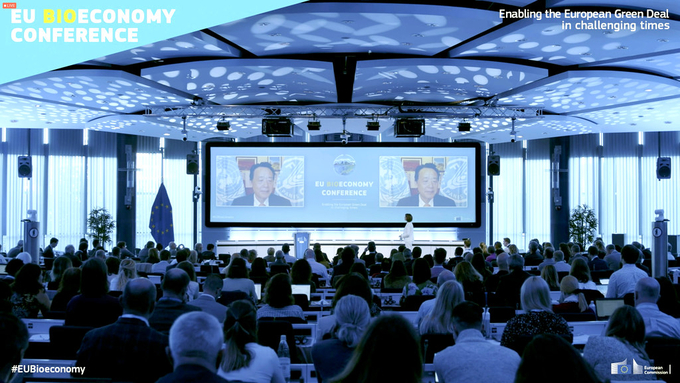May 21, 2025 | 07:15 GMT +7
May 21, 2025 | 07:15 GMT +7
Hotline: 0913.378.918
May 21, 2025 | 07:15 GMT +7
Hotline: 0913.378.918

FAO is involved in global policy discussions around the sustainability of bioeconomy innovations
The Food and Agriculture Organization of the United Nations (FAO) is at the forefront of global efforts to promote bioeconomy innovations and make our agrifood systems more sustainable, Director-General QU Dongyu today told a European Union conference in Brussels.
Qu addressed the conference, entitled The Bioeconomy - Enabling the European Green Deal in Challenging Times, during its High-Level opening session, along with leading members of the European Commission, representatives from the Czech presidency of the EU, and Member States.
The Director-General noted that an economy based on biotechnology, with bio-industry and bio-products, together with innovations, can play an important role in addressing today’s challenges, which range from the growing impact of the climate crisis, to surging food and production prices amid ongoing conflicts and the war in Ukraine.
Meanwhile, FAO’s latest report on The State of Food Security and Nutrition in the World informs that up to 828 million people went hungry last year – an increase of 150 million since 2019.
“If we are to overcome these challenges, we must fully recognize that agriculture is a key part of the solution, and that innovation across agrifood systems is critical,” Qu said. “We must use science and innovation to help mitigate, adapt and build resilience in the face of climate change, and to reach new levels of productivity, quality, diversity, efficiency, and environmental sustainability in agrifood systems.”
Promoting a circular bioeconomy could also help tackle the scourge of food loss and waste. The food that is lost or wasted each year could feed 1.26 billion people, according to FAO estimates.
FAO’s role
Bioeconomy for Sustainable Food and Agriculture is a programme priority area within FAO’s Strategic Framework 2022-2031, which steers FAO’s efforts to transform agrifood systems and promote a food secure world for all, as envisioned by the 2030 Agenda on Sustainable Development.
FAO is at the forefront of global policy discussions around the sustainability of bioeconomy innovations, including on topics such as microbiome science, alternative proteins, biopesticides, biofertilizers, biotechnology-based plastics and other bio-materials, including bio-vaccines, waste reduction and biomass re-use.
This is reflected through FAO’s leadership of the International Sustainable Bioeconomy Working Group, which supports countries in building a sustainable and circular bioeconomy through shared knowledge and experiences.
FAO is also supporting EU policymakers and contributed to the consultations of the recently adopted EU Bioeconomy Strategy Progress Report.
Now, FAO aims to leverage the opportunities of the bioeconomy to support the transformation of agrifood systems towards more sustainable consumption and production systems. The programme also supports the implementation of two recently endorsed complementary thematic strategies, on climate change and on science and innovation.
“To achieve the 2030 Agenda for Sustainable Development, we need a global transition towards better production, better nutrition, a better environment, and a better life for all, leaving no one behind,” Qu said.
“Let us strengthen and increase international cooperation in the bioeconomy field with other key partners to bring about the innovative and transformative changes that can improve the lives and livelihoods of all,” Qu said.
(FAO.org)

(VAN) Attempts to bring down the price of the Japanese staple have had little effect amid a cost-of-living crisis.

(VAN) Fourth most important food crop in peril as Latin America and Caribbean suffer from slow-onset climate disaster.

(VAN) Shifting market dynamics and the noise around new legislation has propelled Trouw Nutrition’s research around early life nutrition in poultry. Today, it continues to be a key area of research.

(VAN) India is concerned about its food security and the livelihoods of its farmers if more US food imports are allowed.

(VAN) FAO's Director-General emphasises the need to work together to transform agrifood systems.

(VAN) Europe is facing its worst outbreak of foot-and-mouth since the start of the century.

(VAN) The central authorities, in early April, released a 10-year plan for rural vitalization.